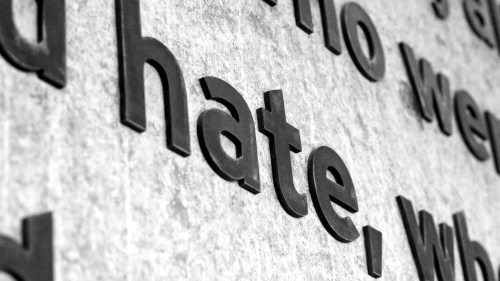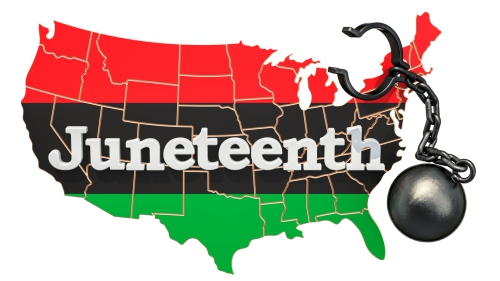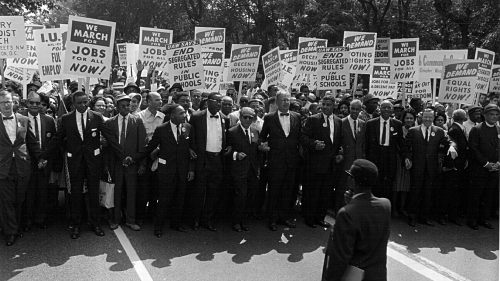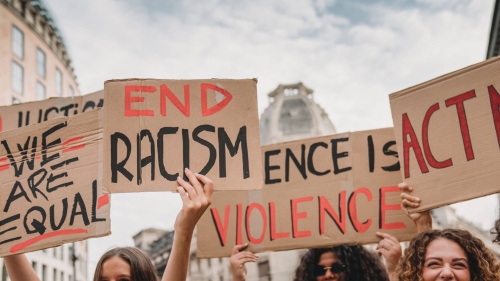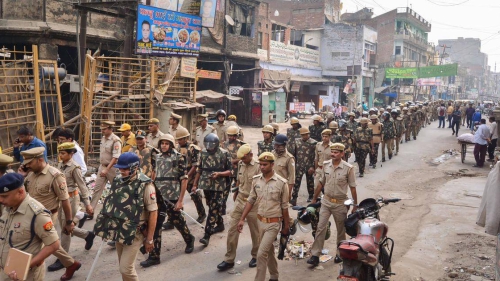Going Deep: Race and The Third Rail

Let's take a stroll along the third rail of American culture, shall we?
We can follow it straight into the grocery store, where Joy DeGruy and her sister-in-law are standing at the checkout line. The sister-in-law, who is biracial but looks white, chats amiably with the clerk as she writes out a check for her groceries, and life is lovely as can be. But when Joy, who is black, tries to pay for her groceries, the clerk stares at her coldly and asks for two pieces of ID, then searches for her name on the "bad check" list. Joy's 10-year-old daughter, standing with her mom, wells up with tears, unable to fathom why this sweet, friendly checkout girl has suddenly turned mean.
Well, here's why: ". . .these people are a danger to America greater and more insuperable than any of those that menaced the other great civilized states of the world."
We just need to follow the third rail back to 1884, as Harvard scholar Nathaniel Southgate Shaler (quoted above) holds forth in Atlantic magazine. Or back, back, across time and oceans, to a 15th century papal directive: "Any land that was not inhabited by Christians was available to be 'discovered.'"
The third rail is, of course, race - racial insanity, actually: the schism, deeper than the Mariana Trench, separating Europe from the rest of humanity. We've inherited it and we're stuck with it, whether we're black or white, brown or red, light-skinned or dark-skinned, abolitionist or flag-waving son of the Old South. And we don't talk about it, at least not during the normal course of the day. But race is ever-present as we go about our lives, igniting emotions we usually succeed in politely suppressing, unless . . . oh, an African-American woman, say, wants to write a check for her groceries.
Author Joy DeGruy tells her story in a remarkable documentary called Cracking the Codes: The System of Racial Inequality, produced and directed by Shakti Butler, who is the founder of World Trust, an organization committed to breaking through the shame, secrecy and dishonesty that American culture is trapped in regarding both its racial history and present-day practices. The other quotes were also part of the film, which dug relentlessly at the structural and institutional racism of our society for the purpose of getting people to talk about it.
DeGruy told her story not for the purpose of vilifying the clerk at the store, but to address the complexity of everyday racial encounters, which pull in everyone. The sister-in-law, Kathleen, turned around when she saw what was happening, using her "white privilege" to intervene and ask the clerk, "Why are you doing this?" Other customers then expressed outrage and eventually the manager came over. And a fragment of American society addressed its racial assumptions more deeply than it normally does.
The film, and the unique discussion that accompanied it, were part of a three-day conference on race and restorative justice I attended last week in Chicago. The planning committee for this amazing, multiracial event, held at Roosevelt University, included the Community Justice for Youth Institute, the Illinois Balanced and Restorative Justice Project and many other participants in this city's growing movement to change the criminal justice paradigm and replace a punishment mentality with the consciousness of healing.
I'm happy to say over 100 people attended it. Something big is happening here. The conference was called "Going Deep" and that's what we did, though I flail right now in wordlessness, not knowing how to dig at the complexity of what occurred.
We walked the third rail of racism and white privilege. We revisited the outrage and unhealed wound called slavery. Indeed, Joy DeGruy, who told the tale of being humiliated at the grocery store, is the author of Post-Traumatic Slave Syndrome, a book that examines slavery's psychological legacy, which includes a slave mother's hesitancy to praise her own children for fear that positive attention could lead to their sale. She had to denigrate her children in order to protect them, DeGruy pointed out. And this perversely protective instinct may still be alive many generations later, wreaking damage on family ties.
This is not easy to talk about. That's why the discussions, often among smaller, breakout groups of conference participants, were unlike any I've ever participated in. I found myself at sea, some of the time, coming to grips with my own white privilege, which was usually invisible to me. I grew up in the then-all white suburb of Dearborn, Mich., where whiteness was disguised, simply, as "normalcy."
Race was an abstraction. We were far from its raw edge, unless we crossed Wyoming Avenue into Detroit. We said things like "That's very white of you." And much, much worse. The city fathers and the real estate industry were aligned in their commitment to keep Dearborn white. The schools taught a version of history that included such phrases as "the first white man to explore . . ." I grew up in fortified ignorance.
At the conference I confronted my upbringing and my whiteness. In one of the breakout circles we read the poem "The Usual Suspects," by Reginald Harris, which gouged a hole in the fortification of whiteness that I thought I had disavowed and dismantled. The poem addresses the phenomenon of criminalizing black males. It consists solely of police blotter descriptions of the usual suspects, which go on and on:
. . . Black Man, 50, says he is a college professor. See
how well he grades papers handcuffed in a cell
Black Man, 57. Occupation: jazz musician. Has clippings
in pocket as quote-unquote proof. Burn them
Black Man, 39. Protests he has no interest in, would never rape
a woman. Says he's gay. Mention this when throwing him
in cell with other inmates. If not one now, he will be
once they're done
Black Man, height 5'8", 5'7", 4'9", 6'1", 6'3", 6'5", 7'4" -
A 6'9" Senior from the University of North Carolina
Black Man, weight 150, 195, 210, 200, 260, 190, 300 -
Weighing in at two twenty-five, pound-for-pound the best fighter in the world
Black Man, age 27, 32, 48, 73, 16, 17, 18, 8 -
aged 13 and 9 respectively, under arrest for attempted murder,
have been charged as adults (charges later dropped)
Black Man Black Man Black Man Black Man Black Man
Black
Man
Somehow this undid me, but I wanted to be undone. The conference churned up discomfort for everyone, but in that discomfort - as we discussed, among so much else, the prison industrial complex and the living continuation of legal racism - I could feel a national conversation getting underway. This conversation has to continue and it has to expand. At the far end of it is, I hope, atonement and a different kind of world.
I know this much. I came away deciding I identify with one race only: the human race.
*****
Robert Koehler is an award-winning, Chicago-based journalist and nationally syndicated writer. His book, Courage Grows Strong at the Wound (Xenos Press), is still available. Contact him at koehlercwgmail.com or visit his website at commonwonders.com.
2014 TRIBUNE CONTENT AGENCY, INC.










